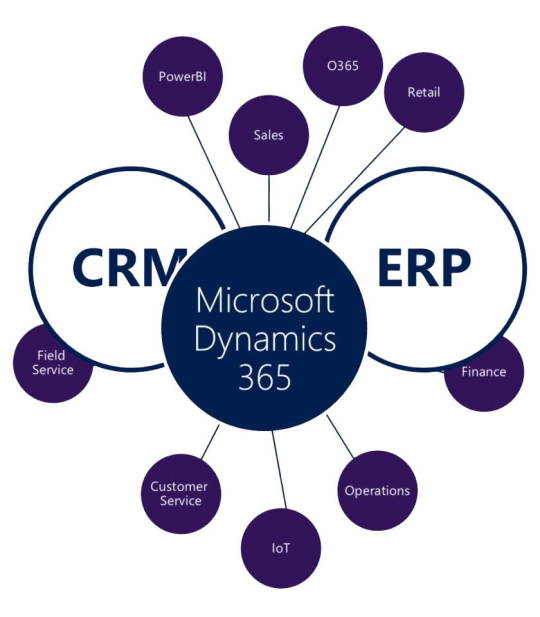#Microsoft ERP Implementation Partner
Explore tagged Tumblr posts
Text
Exploring about Implementing of Microsoft Dynamics 365 Finance in India
Implementing Microsoft Dynamics 365 Finance in India, or anywhere else for that matter, involves a series of steps and considerations. Dynamics 365 Finance is an enterprise resource planning (ERP) system that can help organizations manage their financial operations and gain insights into their financial performance. Here's a high-level overview of the steps you might take for an implementation in India:
Needs Assessment: The first step is to understand the specific needs and requirements of your organization. Identify the financial processes that need improvement and define your goals and objectives for the implementation.
Select an Implementation Partner: It's often advisable to work with a certified Dynamics 365 implementation partner. These partners have experience and expertise in implementing the system and can help tailor it to your specific needs.
Licensing and Software Acquisition: Purchase the necessary Dynamics 365 Finance licenses for your organization. Ensure that you have the appropriate number of user licenses and any required add-ons.
Infrastructure and Technical Setup: Prepare your IT infrastructure to support the software. Ensure that you have the required hardware, network, and software prerequisites. This may also involve cloud setup if you opt for the cloud-based version of Dynamics 365.
Customization and Configuration: Work with your implementation partner to configure Dynamics 365 Finance to meet your specific business needs. This may involve setting up chart of accounts, workflows, approval processes, and other customization.
Data Migration: If you are transitioning from another system, you'll need to plan and execute a data migration strategy. Ensure that your historical financial data is accurately transferred to Dynamics 365.
User Training: Train your staff on how to use Dynamics 365 Finance effectively. This can involve creating training materials and providing hands-on training sessions.
Testing: Conduct extensive testing to ensure that the system works as expected and that it meets your business requirements. This should involve unit testing, integration testing, and user acceptance testing.
Go-Live: Once testing is successful, you can go live with Dynamics 365 Finance. This is the point at which you'll start using the system for your day-to-day financial operations.
Support and Maintenance: Post-implementation support is crucial. Be prepared to address any issues, provide ongoing training, and implement updates and patches as necessary.
Compliance with Indian Regulations: In the case of India, it's essential to ensure that your ERP system complies with the country's specific financial and taxation regulations. Dynamics 365 Finance can be configured to support Goods and Services Tax (GST) and other Indian tax requirements.
Continuous Improvement: ERP implementations are not a one-time project. It's important to continually assess and improve your system to align with changing business needs and regulatory requirements.
Change Management: Effective change management is essential to help your employees adapt to the new system. Address resistance to change and provide adequate support during the transition.
Keep in mind that Dynamics 365 Finance can be customized extensively, so the specifics of your implementation will depend on your unique business requirements. Working with an experienced implementation partner can greatly facilitate the process, and they can help ensure that the system is tailored to the needs of your organization in the context of the Indian business environment.
Is this conversation helpful so far?
#Microsoft Dynamics 365 F&O Implementation#Microsoft ERP Implementation Partner India#Dynamics 365 Finance & Operations Implementation Partner#Microsoft ERP Implementation Partner
0 notes
Text
Microsoft Dynamics 365 Implementation Partners | JRS Dynamics Info Solutions
Transform your business with Microsoft Dynamics 365, implemented by JRS Dynamics, your trusted partner for seamless ERP and CRM solutions.
Why Choose JRS Dynamics as Your Implementation Partner? ✅ Expertise in Dynamics 365 ✅ Tailored Implementations ✅ Global Reach ✅ Ongoing Support
JRS Dynamics ensures a smooth transition to Dynamics 365, enabling you to streamline processes, enhance customer relationships, and drive business growth.
Learn more about our services at: https://jrsdynamics.com/jrs-solution/
Partner with JRS Dynamics to unlock the full potential of Microsoft Dynamics 365!
#digitaltransformation#businessgrowth#businesssolutions#erpsolutions#businessmanagement#businesssuccess#microsoftdynamics365#dynamics365#erp#jrsdynamics#Microsoft Dynamics 365#Microsoft Dynamics 365 Implementation Partners
1 note
·
View note
Text
https://focusdynamics.com.au/
Strategic Focus, Dynamic Solutions
Your expert partner in Dynamics 365 solutions.
Focus Dynamics Group is an experienced team that specialises in providing advanced Dynamics 365 solutions. We believe in the powerful combination of the right people with the right technology for ultimate customer success.

#dynamics 365#microsoft dynamics 365#dynamics 365 solution#dynamics 365 finance#dynamics 365 business central#dynamics 365 partner#dynamics 365 consultant#dynamics business central#dynamics 365 erp#business central#microsoft dynamics business central#dynamics 365 customer service#dynamics 365 sales#dynamics 365 project operations#dynamics 365 field service#dynamics 365 finance and operations#dynamics 365 crm#dynamics 365 implementation#dynamics 365 marketing#dynamics erp#power automate
0 notes
Text
Leading Microsoft Dynamics 365 Implementation & Support Partner. Boost your business with BaffleSol Technologies delivers expert solutions for business growth.
#Microsoft Dynamics 365 Implementation Services#Microsoft Dynamics 365 Implementation Partner in India#ERP Implementation Partner
0 notes
Text
#erp for manufacturing industry#microsoft dynamics erp#dynamics 365 implementation#microsoft dynamics partner
0 notes
Text
Navigating the Future: Dynamics 365 Trends and Innovations in Implementation
The clouds are gathering, and they’re not just rain clouds: it’s the storm of digital transformation, with Microsoft Dynamics 365 at the epicentre. The forecast is booming growth, propelled by influential trends: the cloud, AI, and industry-specific solutions.
In the dynamic digital transformation landscape, the Microsoft Dynamics 365 suite has emerged as a pivotal force, empowering organizations to streamline operations, enhance customer engagement, and adapt to evolving market trends. Why? Scalability, flexibility, and security, for starters. With the cloud, you can adapt to changing needs effortlessly, access your data from anywhere, and sleep soundly, knowing Microsoft’s robust infrastructure protects your valuable information. As Microsoft sets sights on the future, the global Microsoft Dynamics market is poised for significant growth, with a projected CAGR of 12.2%, reaching a valuation of US$ 34,215.8 million by 2033. This surge is attributed to several critical factors, including the increasing shift towards cloud adoption, deeper integration with AI and IoT technologies, and developing industry-specific solutions tailored to diverse sectors.
Cloud Adoption Driving Growth:
One of the primary reason’s behind the anticipated growth of Microsoft Dynamics is the surging popularity of cloud-based business solutions. As more businesses migrate to the cloud, the demand for comprehensive solutions like Microsoft Dynamics 365 is expected to soar, creating new opportunities and challenges for the industry.
Deeper Integration with AI and IoT:
The future of Dynamics 365 is intrinsically linked to its ability to integrate seamlessly with cutting-edge technologies such as Artificial Intelligence (AI) and the Internet of Things (IoT). Microsoft’s strategic acquisitions of companies like Two Hat, specializing in AI content moderation, and ReFirm Labs, enhancing security across IoT, intelligent edge, and cloud servers, underscore the commitment to fortify Dynamics 365 with advanced capabilities. This deeper integration is not just a feature but necessary to stay competitive and relevant in a rapidly evolving digital landscape.
Industry-Specific Solutions:
To cater to the unique needs of various sectors, developing industry-specific solutions is becoming a cornerstone of Dynamics 365’s evolution. As organizations seek tailored solutions to optimize their processes, the market is witnessing a shift towards niche offerings. This customization allows businesses to leverage the full potential of Microsoft Dynamics, further driving adoption across diverse industries.
Strategic Acquisitions and Technological Priorities:
Microsoft’s recent acquisitions reveal a strategic focus on technologies crucial for the future of Dynamics 365. Acquiring Nuance, a leader in AI and speech technology, and RiskIQ, a cybersecurity platform, demonstrates a commitment to creating a “hyper-connected business” while prioritizing cybersecurity and supporting flexible, hybrid work environments. These acquisitions position Microsoft to provide end-to-end solutions that address the evolving needs of businesses in an increasingly digital world.
AI as a Key Business Differentiator:
Business leaders emphasize enhancing productivity, managing flexible work arrangements, and fostering collaboration, regardless of location, as critical aspects of the employee experience. They consider AI usage a critical business differentiator, appreciating its capacity to bolster higher-order thinking, support data-driven decisions, and improve employee productivity beyond mundane tasks.
Dynamics 365 Copilot – Revolutionizing Workflows:
Microsoft recently introduced Dynamics 365 Copilot, the world’s first AI copilot integrated into ERP applications from Dynamics 365 in the cloud. This innovative tool is designed to augment workflows, uncover insights, identify the following best actions, and reduce time spent on administrative tasks. Organizations relying on on-premises applications will need help to compete with peers embracing these AI-powered technologies in the cloud. It is paramount for companies to migrate their critical business processes to the cloud now to harness the full potential of Dynamics 365 Copilot and stay ahead in the digital race.
BaffleSol’s Commitment to the Future:
In conclusion, the future of Dynamics 365 is marked by unprecedented growth and innovation. To navigate this landscape successfully, businesses must embrace cloud adoption, leverage AI and IoT integration, and embrace industry-specific solutions. Microsoft’s strategic acquisitions and the introduction of Dynamics 365 Copilot underscore their commitment to staying at the forefront of technological advancement. As a forward-thinking partner in this journey, BaffleSol is committed to assisting businesses in their digital transformation, ensuring they harness the full potential of Microsoft Dynamics to thrive in the evolving business ecosystem. We are more than consultants; we are copilots in your digital transformation journey. Choose BaffleSol as your partner, embrace Dynamics 365 and AI, and watch your business soar to new heights.
Microsoft Dynamics 365 Implementation PartnerMicrosoft Dynamics 365 Implementation Services
#Microsoft Dynamics 365 Implementation Services#Microsoft Dynamics 365 Implementation Partner in India#Microsoft Dynamics 365 FinOps Services#ERP Implementation Partner
0 notes
Text
Providing the best consulting and support services for MS Dynamics F&O, CRM and Business Central. Our Strategy Experienced Team, Focussed Approach, Innovative Solutions & Optimized Price
#ERP#microsoft partner#microsoft Dynamic Services#business central services#program management services#project management services#agile implementation services#power platform services
0 notes
Text
Finding the Right Microsoft Dynamics CRM and ERP Partners in UAE

Microsoft Dynamics solutions are essential for businesses looking to streamline operations, enhance customer relationships, and improve overall efficiency. For companies in the Dubai, choosing the right Microsoft Dynamics CRM Implementation Partners ensures a seamless deployment and maximizes the benefits of this powerful platform. Whether you need a new implementation or an upgrade, selecting experienced partners is crucial for success.
Why Work with Microsoft Dynamics 365 CRM Partners UAE?
The UAE is a business hub with diverse industry needs, making it essential to have the right CRM and ERP solutions in place. Partnering with Microsoft Dynamics CRM Partners UAE provides access to local expertise, tailored solutions, and ongoing support to optimize business performance. These partners understand regional market requirements and compliance regulations, ensuring smooth and efficient CRM implementation.
Advantages of Microsoft Dynamics ERP & CRM Partners in UAE
Businesses in the UAE require advanced solutions to stay competitive. Collaborating with MS Dynamics ERP & CRM Partners in Dubai offers several key benefits, including:
Expert Implementation: Professional partners ensure smooth and efficient deployment of Microsoft Dynamics 365 CRM and ERP.
Customization & Integration: They tailor the solution to your business needs and integrate it with existing systems.
Training & Support: Ongoing training and technical support enhance system usability and performance.
Regulatory Compliance: Local partners help ensure compliance with UAE business regulations.
Choosing the Right Microsoft Dynamics 365 CRM Partners in UAE
Selecting the right Microsoft D365 CRM Partners in Dubai involves evaluating expertise, industry experience, and customer feedback. A trusted partner should have a proven track record of successful CRM and ERP implementations and a deep understanding of industry-specific challenges.
List of Microsoft Dynamics Partners in Dubai and UAE
If you're searching for a List of Microsoft Dynamics Partners in Dubai or a List of Microsoft D365 Partners in UAE, there are several reputable firms providing comprehensive ERP and CRM implementation services. These partners assist businesses in achieving digital transformation and operational excellence through MS Dynamics solutions.
Conclusion
Choosing the right Microsoft Dynamics CRM Implementation Partners is a critical decision for businesses aiming to enhance efficiency and customer engagement. By working with experienced Microsoft D365 CRM Partners UAE, companies can ensure a successful deployment and long-term operational success. Partnering with Microsoft D365 ERP & CRM Partners in Dubai helps organizations fully leverage Microsoft Dynamics 365 CRM and achieve sustainable business growth.
0 notes
Text
IFI Techsolutions is a trusted Microsoft Solutions Partner in California, specializing in Azure, Dynamics 365, Business Central, and Power Platform solutions. We help businesses with cloud migration, ERP/CRM implementation, AI automation, and digital transformation. Contact us today for expert Microsoft solutions tailored to your business needs!
0 notes
Text
Migrate Nav To Business Central
Migrating from NAV to Business Central offers businesses a more streamlined, modern solution for managing financials, operations, and customer relationships. Microsoft Dynamics NAV has long been a popular ERP solution for small to medium-sized businesses, but Business Central provides an enhanced, cloud-based platform that integrates seamlessly with other Microsoft applications. The transition to Business Central enables businesses to leverage real-time data, improved automation, and advanced reporting capabilities, all while benefiting from the latest innovations in AI and machine learning.At Intelegain Technologies, we specialize in providing comprehensive migration services from NAV to Business Central, ensuring a smooth and efficient transition. Our team of experts handles every step of the migration process—from planning and data mapping to implementation and post-migration support—so you can focus on growing your business without disruption. With our deep understanding of both NAV and Business Central, we ensure that the unique needs of your business are met, providing customized solutions for a seamless upgrade. Whether you’re moving to the cloud for the first time or upgrading your existing system, Intelegain Technologies is your trusted partner for NAV to Business Central migration.
0 notes
Text
Ideas for Microsoft ERP Implementation Partner India CRM and ERP development
Implementing Microsoft ERP systems in India can be a complex process, and it is important to find the right partner to help with CRM and ERP development. Here are ten ideas for Microsoft ERP Implementation service partners in India:

Industry expertise: Look for a partner who has experience in your specific industry. They need to understand the unique challenges and needs of your business.
Local presence: A local partner in India can provide better on-site support and have a deeper understanding of the local business environment.
Microsoft Certified: Make sure the partner is a certified Microsoft Partner with expertise in Microsoft Dynamics 365, as this demonstrates their commitment to the quality and expertise of Microsoft’s products.
Customizability: Your ERP system should adapt to your unique business processes. Choose a partner with strong customization and development capabilities.

Integration Skills: A good ERP partner should have experience integrating Microsoft ERP solutions with other business applications, such as CRM, eCommerce, and HR systems.
Scalability: Your ERP system should be able to grow with your business. Make sure the partner has experience implementing scalable solutions.
Data Protection and Compliance: Data protection and compliance with local regulations like GST are important in India. Choose a partner that has the expertise to ensure that your ERP system complies with all necessary regulations.
Training and Support: The partner should provide comprehensive training for your employees and provide ongoing support for the ERP system.
Case studies and references: Ask for case studies and customer references to check the partner’s track record and their prior implementation success.

Change Management: Consider a partner that provides change management services to help your organization smoothly transition to a new ERP system.
Cloud expertise: When considering a cloud-based ERP solution, look for a partner with expertise in cloud deployment and management.
Portability and Availability: Ensure that the ERP system is accessible on mobile devices, as this is becoming increasingly important for businesses in India.
Performance Improvement: As your business grows, a good partner should have ways to improve the performance of your ERP system.
Innovation and Enhancements : Choose a partner who stays on top of the latest Microsoft ERP advancements and can help you make the most of new features and updates.
Consider your business’ specific needs, budget and long-term goals while choosing a Microsoft ERP implementation partner in India. Evaluate potential partners carefully to ensure ERP functions well in line with your business objectives.
#Microsoft ERP implementation partner in India#Microsoft ERP implementation partner#Dynamics 365 F&O Implementation
1 note
·
View note
Text

Microsoft Dynamics ERP Consulting Services | ERBrains
Looking for expert Microsoft Dynamics ERP consulting? ERBrains offers comprehensive solutions to streamline your business processes, enhance productivity, and drive growth. Our team of certified consultants specializes in implementing, customizing, and optimizing Microsoft Dynamics ERP to meet your unique business needs. Partner with us to unlock the full potential of your ERP system and achieve seamless operational efficiency. Visit our website for tailored ERP consulting services designed to deliver results.
0 notes
Text
Contact JRS Dynamics Today - ERP and CRM Software Company in India
#jrsdynamics#digitaltransformation#businessmanagement#businesssolutions#erpsolutions#erp#businesssuccess#microsoftdynamics365#dynamics365#businessgrowth#ERP and CRM Software Company in India#Microsoft Dynamics 365 Implementation Partners#Microsoft Partner
1 note
·
View note
Text
Why Choose Odoo Over Other ERP Solutions?
In today's competitive corporate environment, selecting the appropriate Enterprise Resource Planning (ERP) software is critical to efficiency, productivity, and scalability. With so many ERP options on the market, businesses frequently struggle to find the perfect fit. Odoo stands out among the main ERP solutions for its power, flexibility, and cost-effectiveness. But why is Odoo preferred over other ERP systems like SAP, Oracle, and Microsoft Dynamics? Let's look at the primary benefits of Odoo ERP.
1. All-in-One Business Solution
Odoo, unlike typical ERP systems, provides a comprehensive suite of apps that includes CRM, accounting, inventory management, human resources, e-commerce, and other features. This integrated strategy reduces the need for different software solutions, resulting in a more streamlined user experience and increased operational efficiency.
2. Open-Source and Cost-Effective
One of Odoo's primary advantages is its open-source nature, which makes it far less expensive than proprietary ERPs like SAP or Oracle. Businesses can select between the free Odoo Community edition and the Odoo Enterprise edition, which offers more advanced capabilities at a competitive price. This flexibility guarantees that businesses of all sizes can benefit from a strong ERP without suffering unnecessary costs.
3. User-Friendly Interface
Odoo's modern, intuitive, and easy-to-use interface distinguishes it from many other ERP solutions, which can require extensive training. Odoo's low learning curve and smooth UI design make it accessible to users of all technical backgrounds, increasing adoption rates and lowering onboarding time.
4. Modular and Scalable
Unlike rigid ERP systems, Odoo is modular, allowing organizations to begin with key apps and expand as they grow. Odoo adapts to your demands, ensuring seamless scaling without overcomplicating operations.
5. Customization and Flexibility
Odoo, on the other hand, offers extensive customization capabilities, allowing businesses to easily tailor the system to their specific needs with access to its source code and a wide range of modules. In contrast, many ERP solutions have limited customization options, necessitating costly development to meet unique business needs.
6. Seamless Integrations
Odoo seamlessly interfaces with third-party apps such as PayPal, Stripe, Amazon, eBay, Google Apps, and QuickBooks, ensuring smooth operations across several business processes. This link enables businesses to expand their capacities without affecting current procedures.
7. Cloud and On-Premise Deployment
Odoo offers both cloud-based and on-premise deployment options, allowing organizations to choose the appropriate infrastructure for their security and operational requirements. This is a big advantage over some ERP packages, which are only available in on-premise or SaaS (Software-as-a-Service) versions.
8. Robust Community and Support
Odoo benefits from ongoing updates and breakthroughs because of its worldwide development, partner, and user community. Businesses may access substantial documentation, forums, and professional support to ensure they always have the assistance they require
.
9. Fast Implementation and Updates
Unlike traditional ERP software, which can take months to integrate, Odoo provides speedy deployment options, decreasing downtime and increasing ROI. Regular upgrades ensure that businesses have access to the most recent features and security enhancements.
Read More:
0 notes
Text

BaffleSol Technologies specializes in Microsoft Dynamics 365 implementation services in the coffee industry. Begin your digital journey for seamless integration for optimal efficiency & growth.
#Microsoft Dynamics 365 Implementation Services#Microsoft Dynamics 365 Implementation Partner in India#ERP Implementation Partner#Microsoft Dynamics 365 for Coffee Industry#Microsoft Dynamics 365 for Coffee Manufacturing
1 note
·
View note
Text
BaffleSol Technologies, your trusted Microsoft Dynamics 365 Implementation & Support Partner. Drive growth and optimize operations with our tailored solutions.
#Microsoft Dynamics 365 Implementation Services#Microsoft Dynamics 365 Implementation Partner in India#ERP Implementation Partner
1 note
·
View note